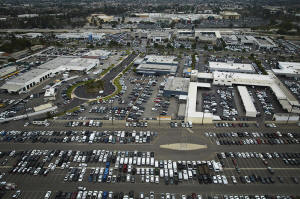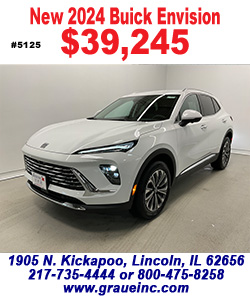Noted economist honored by Trump warns that 25% tariffs risk
'irreparable damage' to US automakers
[March 28, 2025] By
JOSH BOAK
WASHINGTON (AP) — Noted economist Arthur Laffer warns in a new analysis
that President Donald Trump's 25% tariffs on auto imports could add
$4,711 to the cost of a vehicle, adding that the proposed taxes could
weaken the ability of U.S. automakers to compete with their foreign
counterparts.
In the 21-page analysis obtained by The Associated Press, Laffer, whom
Trump awarded the Presidential Medal of Freedom in 2019 for his
contributions to economics, says the auto industry would be in a better
position if the president preserved the supply chain rules with Canada
and Mexico from his own 2019 USMCA trade pact.
The White House has temporarily exempted auto and parts imports under
the USMCA from the tariffs starting on April 3 so that the Trump
administration can put together a process for taxing non-U.S. content in
vehicles and parts that fall under the agreement.
“Without this exemption, the proposed tariff risks causing irreparable
damage to the industry, contradicting the administration’s goals of
strengthening U.S. manufacturing and economic stability,” Laffer writes
in the analysis. “A 25% tariff would not only shrink, or possibly
eliminate, profit margins for U.S. manufacturers but also weaken their
ability to compete with international rivals.”
While Trump’s tariff plans have frightened the stock market and U.S.
consumers, Laffer's analysis shows the administration has yet to
convince even his favored economists that his import taxes would deliver
as promised. The paper reminds Trump that it’s not too late to change
course, specifically complimenting the USMCA negotiated in his first
term as a “significant achievement.”

“The United States-Mexico-Canada Agreement (USMCA) has served as a
cornerstone of President Trump’s first term and has quickly become a
dominant feature of North American trade policy, fostering economic
growth, stabilizing supply chains, and strengthening the U.S. auto
industry,” Laffer writes.
The analysis says that the per vehicle cost without the USMCA exemption
would be $4,711, but that figure would be a lower $2,765 if the
exemptions were sustained.
Trump honored Laffer with the highest civilian honor 45 years after the
economist famously sketched out on a napkin the “Laffer curve” showing
that there's an optimal tax rate for collecting revenue.
[to top of second column] |

An aerial view shows auto dealerships in Cerritos, Calif., Thursday,
March 27, 2025. (AP Photo/Jae C. Hong)
 The bell-shaped curve indicated that
there's a tax rate so high that it could be self-defeating for
generating tax revenues. Many Republicans embraced the curve as
evidence that lower tax rates could generate stronger growth that
would lead to higher tax revenues.
“Dr. Laffer helped inspire, guide, and implement extraordinary
economic reforms that recognize the power of human freedom and
ingenuity to grow our economy and lift families out of poverty and
into a really bright future,” Trump said in awarding him the medal.
Laffer served on the economic policy advisory board of President
Ronald Reagan, in addition to being a university professor. He has
his own economic consultancy, Laffer Associates. In 1970, he was the
first chief economist of the White House Office of Management and
Budget.
Laffer also advised Trump during his 2016 presidential campaign and
co-wrote a flattering book, “Trumponomics: Inside the America First
Plan to Revive Our Economy.”
Laffer Associates did not immediately respond to an email from the
AP seeking comment Thursday night.
Trump maintains that 25% tariffs will cause more foreign and
domestic automakers to expand production and open new factories in
the United States. On Monday, he celebrated a planned $5.8 billion
investment by South Korean automaker Hyundai to build a steel plant
in Louisiana as evidence that his strategy would succeed.
Trump said the 25% auto tariffs would help to reduce the federal
budget deficit while moving more production into the United States.
“For the most part, I think it’s going to lead cars to be made in
one location,” Trump told reporters on Wednesday. “For right now,
the car would be made here, sent to Canada, sent to Mexico, sent to
all over the place. It’s ridiculous.”
All contents © copyright 2025 Associated Press. All rights reserved
 |